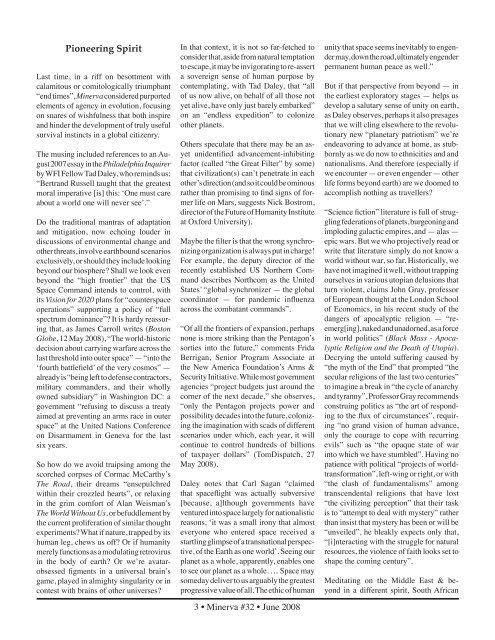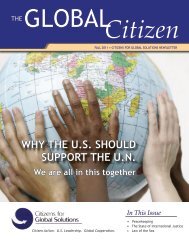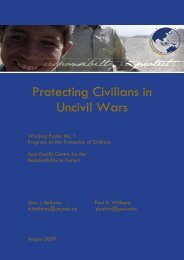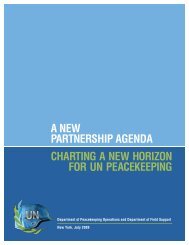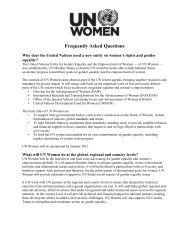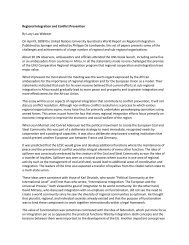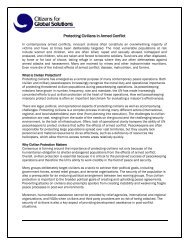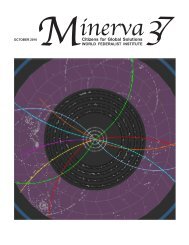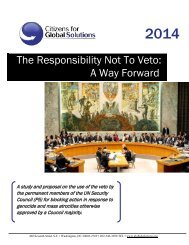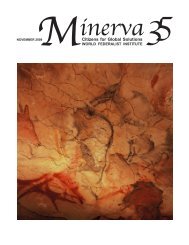Minerva, Spring 2008 (Volume 32) - Citizens for Global Solutions
Minerva, Spring 2008 (Volume 32) - Citizens for Global Solutions
Minerva, Spring 2008 (Volume 32) - Citizens for Global Solutions
You also want an ePaper? Increase the reach of your titles
YUMPU automatically turns print PDFs into web optimized ePapers that Google loves.
Pioneering Spirit<br />
Last time, in a riff on besottment with<br />
calamitous or comitologically triumphant<br />
“end times”, <strong>Minerva</strong> considered purported<br />
elements of agency in evolution, focusing<br />
on snares of wishfulness that both inspire<br />
and hinder the development of truly useful<br />
survival instincts in a global citizenry.<br />
The musing included references to an August<br />
2007 essay in the Philadelphia Inquirer<br />
by WFI Fellow Tad Daley, who reminds us:<br />
“Bertrand Russell taught that the greatest<br />
moral imperative [is] this: ‘One must care<br />
about a world one will never see’.”<br />
Do the traditional mantras of adaptation<br />
and mitigation, now echoing louder in<br />
discussions of environmental change and<br />
other threats, involve earthbound scenarios<br />
exclusively, or should they include looking<br />
beyond our biosphere? Shall we look even<br />
beyond the “high frontier” that the US<br />
Space Command intends to control, with<br />
its Vision <strong>for</strong> 2020 plans <strong>for</strong> “counterspace<br />
operations” supporting a policy of “full<br />
spectrum dominance”? It is hardy reassuring<br />
that, as James Carroll writes (Boston<br />
Globe, 12 May <strong>2008</strong>), “The world-historic<br />
decision about carrying warfare across the<br />
last threshold into outer space” — “into the<br />
‘fourth battlefield’ of the very cosmos” —<br />
already is “being left to defense contractors,<br />
military commanders, and their wholly<br />
owned subsidiary” in Washington DC: a<br />
government “refusing to discuss a treaty<br />
aimed at preventing an arms race in outer<br />
space” at the United Nations Conference<br />
on Disarmament in Geneva <strong>for</strong> the last<br />
six years.<br />
So how do we avoid traipsing among the<br />
scorched corpses of Cormac McCarthy’s<br />
The Road, their dreams “ensepulchred<br />
within their crozzled hearts”, or relaxing<br />
in the grim com<strong>for</strong>t of Alan Weisman’s<br />
The World Without Us, or befuddlement by<br />
the current proliferation of similar thought<br />
experiments? What if nature, trapped by its<br />
human leg, chews us off? Or if humanity<br />
merely functions as a modulating retrovirus<br />
in the body of earth? Or we’re avatarobsessed<br />
figments in a universal brain’s<br />
game, played in almighty singularity or in<br />
contest with brains of other universes?<br />
In that context, it is not so far-fetched to<br />
consider that, aside from natural temptation<br />
to escape, it may be invigorating to re-assert<br />
a sovereign sense of human purpose by<br />
contemplating, with Tad Daley, that “all<br />
of us now alive, on behalf of all those not<br />
yet alive, have only just barely embarked”<br />
on an “endless expedition” to colonize<br />
other planets.<br />
Others speculate that there may be an asyet<br />
unidentified advancement-inhibiting<br />
factor (called “the Great Filter” by some)<br />
that civilization(s) can’t penetrate in each<br />
other’s direction (and so it could be ominous<br />
rather than promising to find signs of <strong>for</strong>mer<br />
life on Mars, suggests Nick Bostrom,<br />
director of the Future of Humanity Institute<br />
at Ox<strong>for</strong>d University).<br />
Maybe the filter is that the wrong synchronizing<br />
organization is always put in charge!<br />
For example, the deputy director of the<br />
recently established US Northern Command<br />
describes Northcom as the United<br />
States’ “global synchronizer — the global<br />
coordinator — <strong>for</strong> pandemic influenza<br />
across the combatant commands”.<br />
“Of all the frontiers of expansion, perhaps<br />
none is more striking than the Pentagon’s<br />
sorties into the future,” comments Frida<br />
Berrigan, Senior Program Associate at<br />
the New America Foundation’s Arms &<br />
Security Initiative. While most government<br />
agencies “project budgets just around the<br />
corner of the next decade,” she observes,<br />
“only the Pentagon projects power and<br />
possibility decades into the future, colonizing<br />
the imagination with scads of different<br />
scenarios under which, each year, it will<br />
continue to control hundreds of billions<br />
of taxpayer dollars” (TomDispatch, 27<br />
May <strong>2008</strong>).<br />
Daley notes that Carl Sagan “claimed<br />
that spaceflight was actually subversive<br />
[because, a]lthough governments have<br />
ventured into space largely <strong>for</strong> nationalistic<br />
reasons, ‘it was a small irony that almost<br />
everyone who entered space received a<br />
startling glimpse of a transnational perspective,<br />
of the Earth as one world’. Seeing our<br />
planet as a whole, apparently, enables one<br />
to see our planet as a whole. … Space may<br />
someday deliver to us arguably the greatest<br />
progressive value of all. The ethic of human<br />
3 • <strong>Minerva</strong> #<strong>32</strong> • June <strong>2008</strong><br />
unity that space seems inevitably to engender<br />
may, down the road, ultimately engender<br />
permanent human peace as well.”<br />
But if that perspective from beyond — in<br />
the earliest exploratory stages — helps us<br />
develop a salutary sense of unity on earth,<br />
as Daley observes, perhaps it also presages<br />
that we will cling elsewhere to the revolutionary<br />
new “planetary patriotism” we’re<br />
endeavoring to advance at home, as stubbornly<br />
as we do now to ethnicities and and<br />
nationalisms. And there<strong>for</strong>e (especially if<br />
we encounter — or even engender — other<br />
life <strong>for</strong>ms beyond earth) are we doomed to<br />
accomplish nothing as travellers?<br />
“Science fiction” literature is full of struggling<br />
federations of planets, burgeoning and<br />
imploding galactic empires, and — alas —<br />
epic wars. But we who projectively read or<br />
write that literature simply do not know a<br />
world without war, so far. Historically, we<br />
have not imagined it well, without trapping<br />
ourselves in various utopian delusions that<br />
turn violent, claims John Gray, professor<br />
of European thought at the London School<br />
of Economics, in his recent study of the<br />
dangers of apocalyptic religion — “reemerg[ing],<br />
naked and unadorned, as a <strong>for</strong>ce<br />
in world politics” (Black Mass - Apocalyptic<br />
Religion and the Death of Utopia).<br />
Decrying the untold suffering caused by<br />
“the myth of the End” that prompted “the<br />
secular religions of the last two centuries”<br />
to imagine a break in “the cycle of anarchy<br />
and tyranny”, Professor Gray recommends<br />
construing politics as “the art of responding<br />
to the flux of circumstances”, requiring<br />
“no grand vision of human advance,<br />
only the courage to cope with recurring<br />
evils” such as “the opaque state of war<br />
into which we have stumbled”. Having no<br />
patience with political “projects of worldtrans<strong>for</strong>mation”,<br />
left-wing or right, or with<br />
“the clash of fundamentalisms” among<br />
transcendental religions that have lost<br />
“the civilizing perception” that their task<br />
is to “attempt to deal with mystery” rather<br />
than insist that mystery has been or will be<br />
“unveiled”, he bleakly expects only that,<br />
“[i]nteracting with the struggle <strong>for</strong> natural<br />
resources, the violence of faith looks set to<br />
shape the coming century”.<br />
Meditating on the Middle East & beyond<br />
in a different spirit, South African


